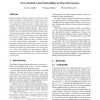Free Online Productivity Tools
i2Speak
i2Symbol
i2OCR
iTex2Img
iWeb2Print
iWeb2Shot
i2Type
iPdf2Split
iPdf2Merge
i2Bopomofo
i2Arabic
i2Style
i2Image
i2PDF
iLatex2Rtf
Sci2ools
111
click to vote
RTAS
1997
IEEE
1997
IEEE
OS-Controlled Cache Predictability for Real-Time Systems
3rd IEEE Real-time Technology and Applications Symposium (RTAS), June 1997 in Montreal, Canada Cache-partitioning techniques have been invented to make modern processors with an extensive cache structure useful in real-time systems where task switches disrupt cache working sets and hence make execution times unpredictable. This paper describes an OS-controlledapplicationtransparent cache-partitioning technique. The resulting partitions can be transparently assigned to tasks for their exclusive use. The major drawbacks found in other cachepartitioning techniques, namely waste of memory and additions on the critical performance path within CPUs, are avoided using memory coloring techniques that do not require changes within the chips of modern CPUs or on the critical path for performance. A simple filter algorithm commonly used in real-time systems, a matrixmultiplication algorithm and the interaction of both are analysed with regard to cache-induced worst case penalties. Worst-case pe...
Related Content
| Added | 06 Aug 2010 |
| Updated | 06 Aug 2010 |
| Type | Conference |
| Year | 1997 |
| Where | RTAS |
| Authors | Jochen Liedtke, Hermann Härtig, Michael Hohmuth |
Comments (0)

